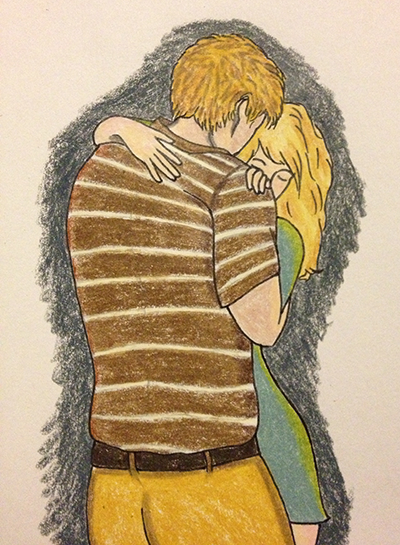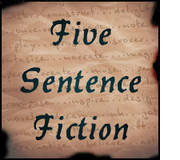by Mayumi-H | Feb 23, 2013 | Short Stories
I seem to be ping-pong-ing with my challenges, lately. Hope that’s all right with everyone. If not…well, too bad.
 This is week 78 for the 100 Word Challenge for Grown-Ups, provided by Julia’s Place. For this week, Julia says the prompt is:
This is week 78 for the 100 Word Challenge for Grown-Ups, provided by Julia’s Place. For this week, Julia says the prompt is:
…what does it taste like…
There were no specific rules about including this phrase in our submissions, so I just ran with the spirit of the prompt.
“In His Kiss”
He smelled clean, electric, like a fresh summer rain that prickled her nostrils every time she drew breath. He felt like it, too: skin slick beneath her fingers, lips wet as he pressed them to hers. His body gave off a flowing heat she felt in wavy vapors as he took her in his arms.
Whispering his desires around their mouths, he pulled her to the ground, plucking gently at her buttons.
She let him do it all. Because she couldn’t go back to the farm. Not after that first kiss, when she’d tasted this fate on his sweet lips.
I’d considered calling this one “A Taste of Things to Come,” but, that just made me think of Shang Tsung.

No raunch, this time. Just good, old fashioned sweetness.
can remember to do so. This prompt provided some fun practice.
As writers, we paint with words to describe. Most often, those words relate to the visual sense. But, what are your next favorite senses in description?
by Mayumi-H | Feb 13, 2013 | Fearless, Persona 4 Fan Fiction, Process
I was going to put up a post about how to give good (amateur) critique, but I decided to go a different direction, because I saw this come up in my hit statistics…again:

Am I really this predictable?
For those of you who are sensitive to the subject of sex, you may want to steer clear of this post and come back on Saturday, when I’ll post some original fiction. For those of you brave enough to continue, though, let’s get wet!
“So…did you?” Niall asked, and Ross blinked.
“Did I what?”
“Have a bang on the beach last night,” Niall said, and gave a distasteful waggle of his tongue.
Ross scowled. “Sex on a beach is tacky,” he said, which was true…not to mention, sand had a tendency to get everywhere, which also made it damn uncomfortable.
Every good romance has some naughtiness to it, whether it’s of the fade-to-black kind or the in-your-face variety. I’ve written both, and I’m of the opinion that each version has its merits…and demerits. No matter how you choose to write your raunch, though, there are a few practicalities to keep in mind:
1.) Sex on a beach is tacky.

It’s an orgasm metaphor.
Let me save you the trouble: having saltwater shoot up your nose while you’re snogging your lover is not a pleasant feeling, no matter how locked your lips are. We’re not even going to talk about how crashing water will make a swimsuit move all over the place, creating uncomfortable ripples and folds more likely to cause laughter than lust, or how sand does, in fact, have a tendency to get everywhere. Even a wetsuit won’t keep that pesky stuff off your skin. Which is why you should always rinse off before you hit the sheets for a post-surf romp, unless you want to be cleaning sand out of your bed for weeks.
A beach can be a romantic place for a tryst, to be certain. Just be certain to remember what else is on a beach, too.
2.) Water is not the same as lube.

“Come on in! The temperature’s fine!”
But, when it comes to sex, be aware of the surroundings, especially if it’s water. We’ve all heard the story that you can drown in even a puddle of water, but water can also counteract the benefits of personal lube. The human body produces its own lubricant, which is designed to smooth out the sometimes-rough mechanics of sex. Water, on the other hand, being the excellent cleaner it is, has a tendency to wash away that lubricant.
Yikes.
So, next time you think about putting that steamy sex scene in a steamy shower, keep in mind the details of such a situation. And that’s not even mentioning the aforementioned issue of rushing water in the face and up the nose….
3.) You’d never mistake a pool for a condom.
A swimming pool offers all the joy and excitement of a midnight skinny-dip without the associated danger of salt poisoning and night feeders.

The dating scene is full of sharks of all kinds….
Which brings me to my last point:
4.) Lovemaking can be lovely, any place.
Don’t let me discourage you, or your characters. On the beach, underwater, in a pool, even in the rain: sex between two people brought together by love can be beautiful, in any location and under any circumstance, so long as you make it so. Even in the typical locale of a shared bed, sex can be thrilling, romantic, ecstatic, funny, relaxing, fulfilling…all this and more. It’s truly about what your characters – and your readers – feel from that love that’s important.
Just remember to think before you put them in a wet situation. 😉
Have you ever written a watery sex scene? Would you ever write one? Why, or why not?
by Mayumi-H | Jan 19, 2013 | Fearless, Short Stories
It’s a threesome this week (no, not that kind of threesome, silly!), as I attempt to combine prompts from Julia’s 100-Word Challenge for Grown-Ups, Lillie McFerrin’s Five Sentence Fiction, and The Daily Post Writing Challenge!
Julia’s prompt this week (week 73) is “…the notes from the piano…“ Since we are to incorporate said phrase, we’re allowed to go to 105 words instead of the standard 100.
Lillie’s prompt this week is FORGOTTEN, and we’re to construct a story around that theme, in five sentences. We don’t have to use the prompt word itself.
The Daily Post’s prompt this week is Starting Over. There are no constraints on word or sentence count.
Let’s recap: 105 words, five sentences, with themes FORGOTTEN and Starting Over, and including the phrase “…the notes from the piano….”
This is my first time trying to pull together three different prompts around one idea, but I think I did pretty all right….
“Stagger to Sway”
Dance, he’d said, as if she could do; her dumb legs could barely remember how to stand, but for the clanking metal of her Zimmer frame! He’d never let her sit back, though: from grabbing her first wave, to making her step up from her chair.
“Everyone’s staring,” she protested.
Tugging her up, he muttered, “Forget ’em,” and, using his hips and shoulders, he took the place of her Zimmer and helped her lurch, inch by staggering inch, from sofa to open floor.
She cursed such slowness…but, in his arms, as the notes from the piano reached her, they began to sway, and she forgot.

(Yes, I know, I forgot pockets. Just as in real life, though, I got distracted by the bum.)
This vignette derives from an early (scrapped) draft of a scene from Fearless, so the characters and conflict are likely familiar to my beta readers. However, the original scene read as too schmaltzy for that particular part of the story (and, you may think it does so, here, as well), but I’d still rather liked it, at its core.
People say you should never completely scrap what you write, because you never know when it may come in handy. I had to do a fair amount of tweaking, but this stands as one of those lucky moments when I got to go back to something I wished I’d been able to keep in the story proper.
Did you play with any of these prompts this week? What happened with the notes of the piano? What was FORGOTTEN? How did your characters Start Over? Let me know!
by Mayumi-H | Jan 7, 2013 | Excerpts, Fearless
(Or, visualisation, if it please you, Beth. ;))
I think writers should be as visual as traditional artists. Perhaps more so, because we need to provide description for a reader, without the benefit of a comic panel or moving image. But, dwelling on description overlong can become tedious for a reader, and that we never want.
“Good morning,” he replied, coming to a slow stop in front of her. He propped his board beside him, shielding her from the bright sun; it didn’t make her any less pretty.
“Ah…Amber, yeah?” he said, feigning blase non-involvement.
She nodded. “And you’re…” She paused a moment. “Fearless?”
He snorted. “Close enough. Ross.”
“Right,” she said. Though from her smile, he guessed she hadn’t needed the reminder, either.
He raised his brow at her. “You need help with something?”
“You said I should stop by,” she reminded him, as she glanced up at the sign of the shop, with its graffiti-style lettering. Looking back to him, she smiled again. “So, here I am.”
“Here you are,” he echoed, as he felt himself break into a smile, too.
That’s the only time the shop sign is mentioned, but I still came up with a design:

The Fearless shop logo
Mostly, I did it because I like playing around with graffiti. But, I also think it’s important for a writer to have a firm vision of the world in which their characters live. The more we know – either in our heads or on the page – the less we need to explain to the reader: the details usually invariably find their way into the story on their own.
I design (or, at least, I keep detailed notes for) every location of any import in my stories, from Ross’s living loft above the shop, to Amber’s hospital room, to the Truro flat. I did the same for a Japanese apaato and a country ryokan, a starfaring tramp tanker and a soldier’s little love nest. Because understanding where your characters are will help everyone understand where they go, how, and why (we call that “blocking” in theatre-speak).
How do you design your locations in your stories?
by Mayumi-H | Jan 5, 2013 | Process
“F***,” Ross swore to himself as soon as he’d closed the door to the loo. Another quietly hissed, “F***,” as he wrenched the metal faucet handle open, and a third as he clenched his fingers beneath the flow of water.
Shouldn’t have come what are you doing here you don’t belong Sam‘s right–
And, of a sudden looking up into the mirror above the sink, he saw the reflection of that oddly proper but still charming wave walker, with the blond hair and clear blue eyes, in the dark shirt and silk tie, and stopped.
“No,” he told that man in a whisper. “It’s just one night. You can do this.” He splashed some water on his face, to cool the flush of red behind his eyes, and looked into the mirror again with a determined stare. “Just keep your bloody mouth shut.”
Apologies for the coarse language above, but I wanted to illustrate a technique used quite a bit in fiction: the inner monologue. Or, put more basically, thoughts in a character’s head.

I try not to dwell in a character’s head overmuch. There are times when it’s convenient to make a point, but I’m well aware that the inner monologue can be a crutch, where the danger is I’ll be informing the reader (telling) of a character’s motivations or feelings rather than letting the character’s actions make those motivations and feelings known more organically (showing).
Almost worse than this fallback to telling, though, is when I see some writers use the inner thought convention in a way that is so formal it becomes unnatural, cumbersome, even. Thoughts become like words spoken aloud, as you might see in a comic book thought bubble…

…when I don’t know of anyone who thinks in structured sentences.
Now, I don’t take issue with a simple thought such as “War sucks,” which is basic and visceral: the emotion is broken down pretty much to its core as can be done. What I do roll my eyes at is a chunk of text broken out as a character’s inner thoughts that is structured so much like a proper paragraph that it could just as well be spoken. That it probably should be spoken:
Perhaps I should go to her, standing there in front of her locker, and ask her if she’d like to go to the dance with me. Just go up and ask her. How hard could that be? If she says yes, maybe I could bring her flowers, too, to show her how much I like her. But what kind should I get? She’s said peonies are her favorite, but what if the florist doesn’t have any peonies? What are peonies, anyway? Oh, blast! Why does young love have to be so complicated?
This is overdoing it, of course, but you get the idea. How boring is that, to be told outright – through an inner monologue, no less! – what the character is thinking and feeling? How much more interesting would it be to guess a little:
He shifted on his feet as he watched her giggle among her friends. Even the way she opened the locker door was full of grace, fingers clutching her books like they were delicate flowers.
Didn’t she like flowers? He’d heard her talk once about peonies – whatever they were – in some conversation or other. Maybe, if he came to her with those before he asked her to the dance, she might notice him, for once….
Actually, I’m not sure if that’s better or worse. 😉 I do know it’s more interesting to write, though, so hopefully it’s more interesting to read.
The inner monologue is a perfectly acceptable convention. Just remember that it shouldn’t be your answer to all explanations. Thoughts are in our heads for a reason. Words from our lips just the same.

Do you employ the inner monologue? If so, how? And, which of those examples do you prefer, if either?
 This is week 78 for the 100 Word Challenge for Grown-Ups, provided by Julia’s Place. For this week, Julia says the prompt is:
This is week 78 for the 100 Word Challenge for Grown-Ups, provided by Julia’s Place. For this week, Julia says the prompt is:












Recent Comments
The Real Person!
Author Mayumi-H acts as a real person and passed all tests against spambots. Anti-Spam by CleanTalk.
The Real Person!
Author Mayumi-H acts as a real person and passed all tests against spambots. Anti-Spam by CleanTalk.